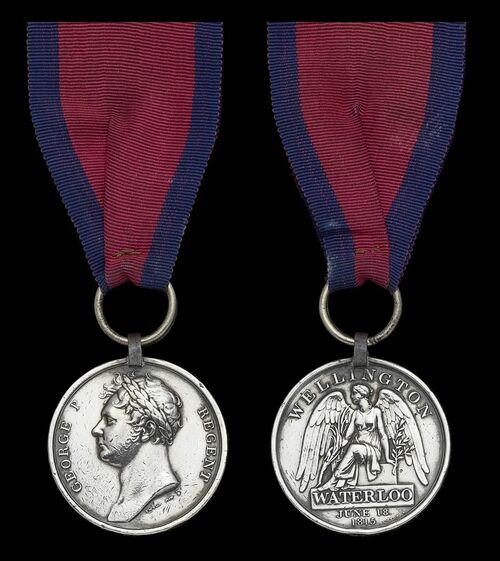
Auction: 24001 - Orders, Decorations and Medals
Lot: 12
Sold by Order of a Direct Descendant
The Waterloo Medal awarded to Lieutenant R. Mayne, 30th (Cambridgeshire) Regiment of Foot, a long-served subaltern who was wounded during that great battle on 18 June 1815
Waterloo 1815 (Lieut. Richard Mayne, 2nd Batt. 30th Reg. Foot.), contemporary replacement split-ring suspension, lightly polished, contact marks to obverse and reverse fields, two minor edge knocks, about very fine
Richard Mayne was born in 1788 and appointed Ensign in the 30th (Cambridgeshire) Regiment of Foot in early 1808. Promoted Lieutenant a year later, it was in this rank that he was to spend no less than 18 years - almost certainly due to the high purchase price of the next 'step up' to Captain; indeed, Mayne had to wait until 1827 to finally be promoted (without purchase) upon the death of another officer - and even that came too late for this veteran officer.
The 2nd Battalion 30th Foot saw a great deal of action during the first few years of the Peninsular War: in Portugal from March 1809, they participated in the Battle of Fuentes de Onoro (May 1811); the sieges of Ciudad Rodrigo and Badajoz (the latter being particularly bloody for the battalion with their Commanding Officer and 138 officers and men killed and wounded); the Battle of Salamanca (July 1812) and several smaller engagements. Interestingly, Mayne receives mention in a recent history of the regiment, which notes: 'Some officers travelled independently. One of them, Lieutenant Richard Mayne, may have been delayed by a personal matter. His soldier servant, William Sloane, who had served with the battalion since volunteering from the Antrim Militia in 1808, deserted on 16 June, taking with him 130 dollars, the property of Mayne. Although it can only be suspicion, there may have been a woman involved. Many men entered into relationships with Spanish and Portuguese women who could not be brought home. It is possible, therefore, that with 130 dollars in his pocket, Sloane decided upon a life of his choice in Portugal.' ('Inside the Regiment: The Officers and Men of the 30th Regiment During the Revolutionary and Napoleonic Wars', Carole Divall, 2011, refers). History does not appear to relate whether Mayne ever recovered his money, but 130 dollars would undoubtedly have been a heavy loss for a young officer in a Line Infantry regiment.
The 2nd Battalion were sent home in December 1812 to recover their strength, and were later assigned to Sir Thomas Graham's army in the Netherlands for that unfortunate campaign which included the unsuccessful Siege of Bergen-op-Zoom in 1814. Remaining in the Low Countries after the cessation of hostilities, the 30th formed part of the Duke of Wellington's allied army for the Waterloo Campaign the following year. They were very heavily engaged on 18 June - indeed of 24 Lieutenants, 14 were subsequently killed or wounded during the battle; Mayne is noted as being one of the latter. ('The Waterloo Roll Call', Charles Dalton, p.140, refers).
In April 1817 the 2nd Battalion (being junior to the 1st) was disbanded and suitable drafts were made up to sail for India, this having been the station for the regiment's senior battalion since 1807; Mayne clearly received orders to sail either during or just before this time, with his obituary stating nine years' service 'in the East Indies'. Like so many, however, the harsh climate ruined his health; upon returning to Britain in 1827 he died, aged 39, at the Infantry Barracks in Canterbury and is buried in that city at the Holy Cross Church. His obituary notice is worth noting in full: 'Dec. 3, in the Infantry Barracks, Canterbury, aged 39, Lieut. Rich. Mayne, of the 30th reg. of Infantry. This Officer had during his career served in six general actions in the Peninsula - in Holland and the Netherlands - in those sanguinary battles of the 16th, 17th and 18th of June, 1815, at Waterloo - and since that period has served 9 years in the East Indies. Lieut. Mayne was highly respected in his regiment, and notwithstanding the service he had seen, had been a Lieutenant for 18 years! He landed at Deal from India, a short time since, being invalided home, but was so exhausted as to be unable to reach his native place.'
Sold with a file of copied research, including Medal Roll extract, London Gazette notifications and copied research. Interestingly, the London Gazette of May 1828 carries notification of Mayne's promotion to Captain - by which time he was, of course, sadly deceased.
Subject to 20% VAT on Buyer’s Premium. For more information please view Terms and Conditions for Buyers.
Sold for
£3,500
Starting price
£1800




